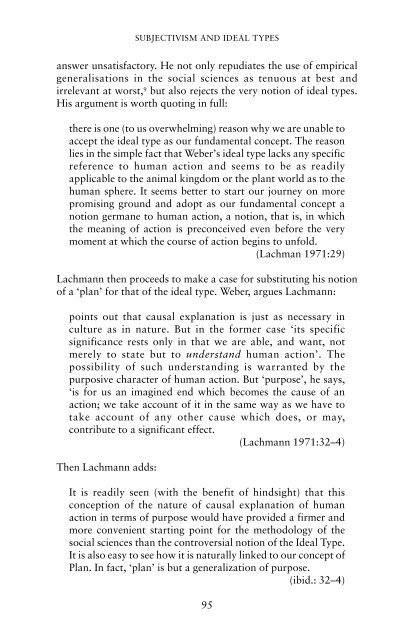Subjectivism and Economic Analysis: Essays in memory of Ludwig ...
Subjectivism and Economic Analysis: Essays in memory of Ludwig ...
Subjectivism and Economic Analysis: Essays in memory of Ludwig ...
Create successful ePaper yourself
Turn your PDF publications into a flip-book with our unique Google optimized e-Paper software.
SUBJECTIVISM AND IDEAL TYPESanswer unsatisfactory. He not only repudiates the use <strong>of</strong> empiricalgeneralisations <strong>in</strong> the social sciences as tenuous at best <strong>and</strong>irrelevant at worst, 9 but also rejects the very notion <strong>of</strong> ideal types.His argument is worth quot<strong>in</strong>g <strong>in</strong> full:there is one (to us overwhelm<strong>in</strong>g) reason why we are unable toaccept the ideal type as our fundamental concept. The reasonlies <strong>in</strong> the simple fact that Weber’s ideal type lacks any specificreference to human action <strong>and</strong> seems to be as readilyapplicable to the animal k<strong>in</strong>gdom or the plant world as to thehuman sphere. It seems better to start our journey on morepromis<strong>in</strong>g ground <strong>and</strong> adopt as our fundamental concept anotion germane to human action, a notion, that is, <strong>in</strong> whichthe mean<strong>in</strong>g <strong>of</strong> action is preconceived even before the verymoment at which the course <strong>of</strong> action beg<strong>in</strong>s to unfold.(Lachman 1971:29)Lachmann then proceeds to make a case for substitut<strong>in</strong>g his notion<strong>of</strong> a ‘plan’ for that <strong>of</strong> the ideal type. Weber, argues Lachmann:po<strong>in</strong>ts out that causal explanation is just as necessary <strong>in</strong>culture as <strong>in</strong> nature. But <strong>in</strong> the former case ‘its specificsignificance rests only <strong>in</strong> that we are able, <strong>and</strong> want, notmerely to state but to underst<strong>and</strong> human action’. Thepossibility <strong>of</strong> such underst<strong>and</strong><strong>in</strong>g is warranted by thepurposive character <strong>of</strong> human action. But ‘purpose’, he says,‘is for us an imag<strong>in</strong>ed end which becomes the cause <strong>of</strong> anaction; we take account <strong>of</strong> it <strong>in</strong> the same way as we have totake account <strong>of</strong> any other cause which does, or may,contribute to a significant effect.(Lachmann 1971:32–4)Then Lachmann adds:It is readily seen (with the benefit <strong>of</strong> h<strong>in</strong>dsight) that thisconception <strong>of</strong> the nature <strong>of</strong> causal explanation <strong>of</strong> humanaction <strong>in</strong> terms <strong>of</strong> purpose would have provided a firmer <strong>and</strong>more convenient start<strong>in</strong>g po<strong>in</strong>t for the methodology <strong>of</strong> thesocial sciences than the controversial notion <strong>of</strong> the Ideal Type.It is also easy to see how it is naturally l<strong>in</strong>ked to our concept <strong>of</strong>Plan. In fact, ‘plan’ is but a generalization <strong>of</strong> purpose.(ibid.: 32–4)95

















